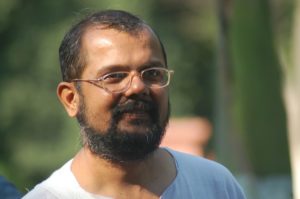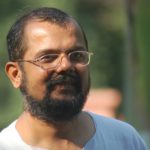Minds of the Movement
An ICNC blog on the people and power of civil resistance
by Ramesh SharmaMarch 27, 2018
Ekta Parishad (“unity forum” in Hindi) is a pluralistic movement for defending rights of marginalized communities in India. Over three decades, it has grown to become today one of the world’s most massive nonviolent movements. Ramesh Sharma is the National Coordinator of Ekta Parishad, and was also interviewed in January by Minds of the Movement.
Landlessness and homelessness are the two most prominent problems among rural populations in India. Close to 100 million (or about 56 percent of rural families) in India do not own agricultural land. A majority of the Indian population relies on land to survive, and thus millions today are living in a permanent state of land insecurity. These people have been unrooted and thrown out into the periphery of society.

Ramesh Sharma of Ekta Parishad.
Despite several progressive laws, land rights for deprived communities are not on the government’s agenda. The government maintains a lack of clarity on who owns the land so they can keep giving it away, including to multi-national corporations.
Since 1992, Ekta Parishad has organized marches totalling 20,000 kilometers as part of our struggle to keep land rights for marginalized populations on the government’s agenda. (Ed: See here for more about EP’s other activities.) Why marches?
Because they serve as constant headaches for the government while simultaneously strengthening solidarity and re-energizing people suffering from landlessness and homelessness. They are transformative experiences for the participants and offer them direct buy-in to the movement. There is no bar for participation in a march; that is why you can see several elderly people, differently abled people, pregnant women and others participating in them. And as a result of our marches over the past decades, the people have gained 400,000 acres of land.
Marches are also a very visual, and frankly, impressive tactic. At the end of one of our marches to Delhi several years ago, police commissioners were awaiting the 25,000 people who participated—not to crack down on them but to welcome them. Our discipline astonished them.
More to the point on movement inclusiveness: In its simplest definition, Ekta Parishad is a school of thought rooted in struggling for justice for marginalized communities and encouraging their creative engagement in democracies. Our vision for tomorrow is entirely rooted in inclusiveness, and this underscores our every action. Over the last three decades, Ekta Parishad has led the collective ownership of the state and the people toward ensuring justice and peace to the deprived communities through all possible democratic means.
In India, democracy has always been an integral core of the independence movement. Ekta Parishad believes democracy is composed of daily shared actions designed to give joint responsibility to the people and the state. We strongly believe that the transformative energies of people’s actions support the construction of a more meaningful democracy.
To Ekta Parishad, inclusiveness also means respecting every ideology rooted in nonviolence. It brings together plural perspectives in a rainbow coalition represented by all sects of deprived communities across the ideological spectrum. (Besides, ideologies can only serve people with full stomachs!) Today, nearly 2,000+ social organizations working toward justice and peace form the umbrella coalition we call Ekta Parishad.
So we are not ideology-based; we are an action-based alliance. Ekta Parishad is extremely open about the types of actions we engage in (as long as they are nonviolent), and everyone understands and accepts their collective ownership and responsibility in the movement.
Above all, nonviolent action as a strategic choice is a fundamental part of having an inclusive mission. For one, the philosophy of nonviolence is a common point between the major religions in India. Ekta Parishad believes that chronic structural violence thrives and spreads in undemocratic institutions. So there is a real urgency to unionize every individual and organization that is acting on the principles of nonviolence for a more just society.
What’s next for Ekta Parishad? This year, we are organizing what will perhaps be our biggest march to amplify the people’s voices for land reforms. It will involve more than 300 districts and potentially draw millions of participants.
Every action is a step on the ladder toward a just society, where recognized inclusiveness brings change first within us and ultimately beyond us, in the society and nation.

Ramesh Sharma
Ramesh Sharma is National Coordinator of Ekta Parishad, a mass movement for land rights of marginalized populations in India. He has collaborated with and assisted other nonviolent movements in more than a dozen other countries. Ramesh has also delivered lectures at Cambridge University, the London School of Economics, and Oxford University as well as the British Parliamentary Committee.
Read More